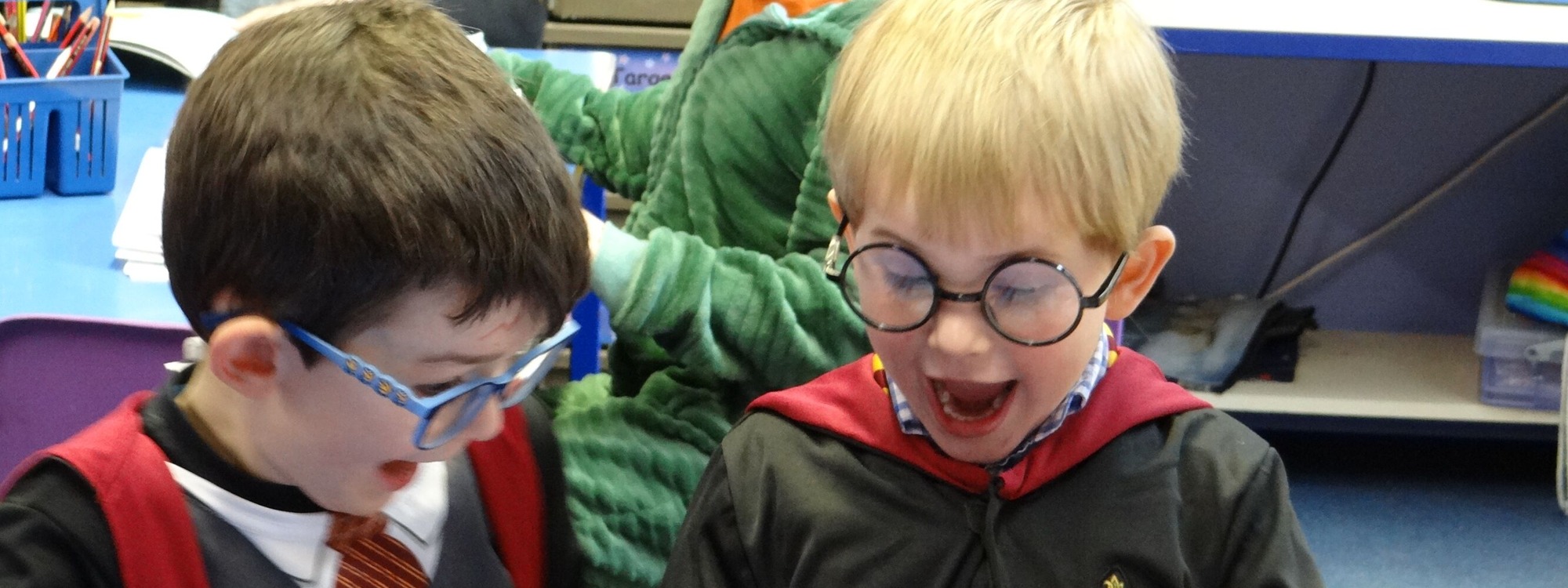At Widcombe Infant School our aim is to enable children to communicate effectively in the spoken and written word. We strive to encourage an enjoyment of reading, through a variety of stimulating experiences.
Reading
The emphasis throughout the school is to read for pleasure and gain information. Children are taught to read in school in a variety of situations including whole class and guided reading groups. In addition children are heard to read individually to practise their reading skills. Children take books home to share with parents and to practise reading skills, developing a link between home and school. Initially the children use books from the Ruth Miskin reading scheme which are then supplemented with books from the Oxford reading scheme, before they move onto paperback books organised in a range of levels. We follow the Phonic Programme Read Write Inc. developed by Ruth Miskin ensuring children are taught to read, recognise and write individual sounds, before learning digraphs (two letters making one sound) and trigraphs (three letters making one sound). Alongside this children are taught to read, recognise and spell tricky words that cannot be sounded out. This work is taught in whole classes and reinforced in specific groups meeting the needs of individuals within the group. The school library is used to support research skills and encourage reading. The library is open after school for children to browse and borrow books.
Writing
We aim to motivate children to develop writing as an essential tool of communication. The children learn to write through composing different forms of writing including stories, recounts and poems. They learn how to spell, making use of the Ruth Miskin approach to phonics and develop fluent, joined handwriting.
Speaking and Listening
Speaking and Listening are an integral part of school life but a strong emphasis is placed on giving distinct opportunities to teach and practise the skills involved such as circle times, assemblies, sharing news, presenting work, discussions, self-evaluation and philosophy.
Drama
Drama at Widcombe Infant School is integrated into all areas of the curriculum. We firmly believe that Drama enhances children’s learning, understanding and development. Dedicated Drama sessions throughout each term develop a range of Drama techniques. Through the use of Drama children are able to re-enact scenarios and events which enables them to develop empathy and supports them in remembering and recalling what they have learnt. In Year 1 the children study the topic of Victorians and the highlight of their learning is often Victorian Day where the children and staff spend the day in role living the life of a Victorian school child.
“On Victorian Day I liked my teacher being really strict and my friend had a really funny face when he had the dunce's cap.” Oliver, aged 6
We have a close link to the ‘Egg Theatre’ which is the local children’s theatre. The children regularly attend productions so that they can see real live professional drama. In addition we endeavour to invite Travelling Light Theatre Company and Drama4All into the school to perform their current shows or to lead workshops. The children very much enjoy this performance and it also introduces them to the concept of silent drama and multiple character roles.
Annually we hold an Arts Week where the children are given the opportunity to learn from professionals and participate in specialised activities. Our recent themes have been the Shakespeare, Under The Sea and Julia Donaldson.
Twice a year our school performs a whole school production. This is a time of year when we feel incredibly proud of our children. Our Reception children learn and perform all the songs with the rest of the school and in addition to singing Year 1 all play a percussion instrument performing the role of our orchestra. Year 2 are the star performers of the show and each year they amaze us with their talent. They perform confidently and independently in a variety of roles including speaking, acting, dancing, singing and solos.
We believe that our children leave the school as confident, articulate children partly due to the amount of drama they are exposed to. Each class holds an assembly every term for their parents and families, to share their learning. Within these assemblies we encourage each child to take part whether it is through speaking, acting, singing or showing their artwork. The children are incredibly proud of and enjoy their assemblies, and it is lovely for the staff and parents to see their confidence grow throughout the years.
| Subject Documents |
|---|
| English Scheme of Work |






